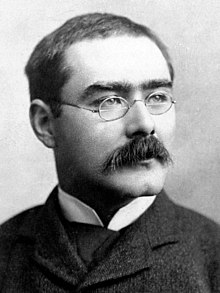
Back Rudyard Kipling Afrikaans ራድየርድ ክፕሊንግ Amharic Rudyard Kipling AN روديارد كبلينغ Arabic روديارد كبلينج ARZ Rudyard Kipling AST Rudyard Kipling AVK Redyard Kiplinq Azerbaijani رودیارد کیپلینق AZB Редьярд Киплинг Bashkir
Rudyard Kipling | |
|---|---|
 Kipling in 1895 | |
| Born | Joseph Rudyard Kipling 30 December 1865 Malabar Hill, Bombay Presidency, British India |
| Died | 18 January 1936 (aged 70) Fitzrovia, London, England |
| Resting place | Poets' Corner, Westminster Abbey |
| Occupation |
|
| Genre | |
| Notable works | |
| Notable awards | Nobel Prize in Literature 1907 |
| Spouse | |
| Children | 3, including Elsie and John |
| Parents | |
| Signature | |
Joseph Rudyard Kipling FRSL (/ˈrʌdjərd/ RUD-yərd; 30 December 1865 – 18 January 1936)[1] was an English journalist, novelist, poet, and short-story writer. He was born in British India, which inspired much of his work.
Kipling's works of fiction include the Jungle Book duology (The Jungle Book, 1894; The Second Jungle Book, 1895), Kim (1901), the Just So Stories (1902) and many short stories, including "The Man Who Would Be King" (1888).[2] His poems include "Mandalay" (1890), "Gunga Din" (1890), "The Gods of the Copybook Headings" (1919), "The White Man's Burden" (1899), and "If—" (1910). He is seen as an innovator in the art of the short story.[3] His children's books are classics; one critic noted "a versatile and luminous narrative gift".[4][5]
Kipling in the late 19th and early 20th centuries was among the United Kingdom's most popular writers.[3] Henry James said "Kipling strikes me personally as the most complete man of genius, as distinct from fine intelligence, that I have ever known."[3] In 1907, he was awarded the Nobel Prize in Literature, as the first English-language writer to receive the prize, and at 41, its youngest recipient to date.[6] He was also sounded out for the British Poet Laureateship and several times for a knighthood, but declined both.[7] Following his death in 1936, his ashes were interred at Poets' Corner, part of the South Transept of Westminster Abbey.
Kipling's subsequent reputation has changed with the political and social climate of the age.[8][9] The contrasting views of him continued for much of the 20th century.[10][11] Literary critic Douglas Kerr wrote: "[Kipling] is still an author who can inspire passionate disagreement and his place in literary and cultural history is far from settled. But as the age of the European empires recedes, he is recognised as an incomparable, if controversial, interpreter of how empire was experienced. That, and an increasing recognition of his extraordinary narrative gifts, make him a force to be reckoned with."[12]
- ^ The Times, (London) 18 January 1936, p. 12.
- ^ "The Man who would be King" Archived 20 May 2013 at the Wayback Machine. Notes on the text by John McGivering. kiplingsociety.co.uk.
- ^ a b c Rutherford, Andrew (1987). General Preface to the Editions of Rudyard Kipling, in "Puck of Pook's Hill and Rewards and Fairies", by Rudyard Kipling. Oxford University Press. ISBN 0-19-282575-5
- ^ Rutherford, Andrew (1987). Introduction to the Oxford World's Classics edition of 'Plain Tales from the Hills', by Rudyard Kipling. Oxford University Press. ISBN 0-19-281652-7
- ^ James Joyce considered Tolstoy, Kipling and D'Annunzio the "three writers of the nineteenth century who had the greatest natural talents", but that they "did not fulfill that promise". He also noted their "semi-fanatic ideas about religion, or about patriotism". Diary of David Fleischman, 21 July 1938, quoted in James Joyce by Richard Ellmann, p. 661, Oxford University Press (1983) ISBN 0-19-281465-6
- ^ Alfred Nobel Foundation. "Who is the youngest ever to receive a Nobel Prize, and who is the oldest?". Nobelprize.com. p. 409. Archived from the original on 25 September 2006. Retrieved 30 September 2006.
- ^ Birkenhead, Lord (1978). Rudyard Kipling, Appendix B, "Honours and Awards". Weidenfeld & Nicolson, London; Random House Inc., New York.
- ^ Lewis, Lisa (1995). Introduction to the Oxford World"s Classics edition of "Just So Stories", by Rudyard Kipling. Oxford University Press, pp. xv–xlii. ISBN 0-19-282276-4
- ^ Quigley, Isabel (1987). Introduction to the Oxford World's Classics edition of "The Complete Stalky & Co.", by Rudyard Kipling. Oxford University Press, pp. xiii–xxviii. ISBN 0-19-281660-8
- ^ Said, Edward (1993). Culture and Imperialism. London: Chatto & Windus, p. 196. ISBN 0-679-75054-1.
- ^ Sandison, Alan (1987). Introduction to the Oxford World's Classics edition of Kim, by Rudyard Kipling. Oxford University Press. pp. xiii–xxx. ISBN 0-19-281674-8
- ^ Douglas Kerr, University of Hong Kong (30 May 2002). "Rudyard Kipling." Archived 26 July 2019 at the Wayback Machine The Literary Encyclopedia. The Literary Dictionary Company. 26 September 2006.